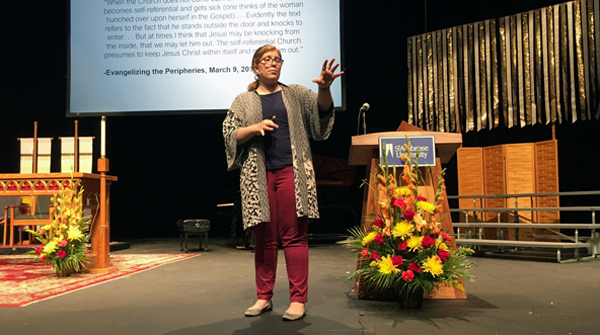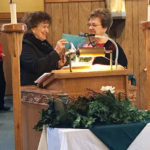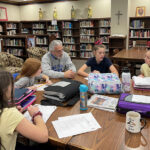
Katie Prejean McGrady talks about faith journeys during her general session and breakout session at the Vision 20/20 Convocation June 7 in Davenport.
By Barb Arland-Fye
The Catholic Messenger
Katie Prejean McGrady, a delegate to the Pre-Synod Gathering of Young Adults at the Vatican last year, recalled for her audience at the Vision 20/20 Convocation a massive crisis of faith she experienced during high school. Hurricane Rita temporarily uprooted her family and she was angry with God, she explained in her June 7 keynote presentation at St. Ambrose University in Davenport titled “The Art of Accompaniment: Sharing that Christ is alive through relationships.”
During this crisis, a deacon came to her Catholic high school classroom for a Q&A session with students. She peppered him with questions, hoping to rip him to shreds, to destroy all of his years of education and training. “He took it, he listened,” Prejean McGrady recalled. The deacon asked her to come to his office after school to continue their chat. She thought, erroneously, that she was in trouble.
He offered her a cup of coffee and they talked for three hours, calling her mother twice to let her know they weren’t done yet. “He answered every question I had,” the now 29-year-old millennial, wife, mother, speaker and author said. “In the course of those three hours of conversation … it was the first time in my head, that somebody saw me not as a nuisance, not as an annoyance, but as someone who had questions about my faith and wanted to know more about this Jesus stuff. He wanted to help me understand it. He wanted to help me unpack that,” she said. He became a mentor, serving as her confirmation sponsor, proclaiming the Gospel at her wedding and bestowing the first blessing on her newborn daughter last year.
Stories, personal and scriptural, sprinkled with humor, served as a vehicle for Prejean McGrady to illustrate the concept of accompaniment and why it is essential to draw people to the Catholic Church. From Scripture, she chose the story of two dispirited disciples who encountered Jesus on the road to Emmaus. Accompaniment, Prejean McGrady said, begins by asking good questions, which Jesus did when he appeared to the two disciples who were walking away from and not toward Jerusalem. Jesus listened attentively to their story; he didn’t cut them off. Jesus proclaimed the truth boldly. The experience changed them. They returned to Jerusalem where they found the other disciples and recounted what had taken place and how Jesus was known to them in the breaking of the bread.
The Gospel’s message is one of closeness, Prejean McGrady said. It calls us to “encounter and exchange, and to accept each other seriously, to journey together and to share without fear.”
She told a story about the origins of the social media app Instagram to illustrate another point about drawing people to the Catholic Church: ask the right question. The two creators of Instagram developed what they thought was a cool app, but downloads of the app plateaued. They consulted an investor who asked them why people weren’t using the app. They couldn’t answer. The investor then said that was a trick question. What they should be asking is why do people download the app? The answer to that question led to what is now a wildly popular social media app.
Don’t ask why millennials and other age groups are leaving the church at an alarming rate (she provided facts about their disaffiliation). Flip the question around to ask, Why do Catholics stay? “Have a conversation about what keeps people in the church rather than why they go away,” she advised.
Young people see through pretense; they long to see Catholic mentors living their faith and demonstrating their love for Jesus, just as the deacon did for her. Accompany individuals with charity and love. Slowly, give them morsels of truth about the Catholic faith, she said. “Our answers to their questions matter. Help plant roots.”
She encouraged her audience to invite their parish priest to dinner and for priests to invest time in families. She also addressed the inadequacy of marriage prep in the Catholic Church. For a husband and wife, “marriage is one of the greatest sacraments of their lives and we leave them after the wedding.” Parishes she said, should be interested in the lifetime of a person.











